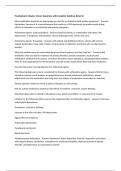Psychopharm Chapter 4 Exam Questions with Complete Solutions Rated A+
What medication would be an appropriate prn med for an individual with anxiety symptoms? - Answers
Alprazolam- because it is a benzodiazepine that works as a CNS depressant to produce quick-acting
effects of relaxation in an individual with anxiety symptoms
Antianxiety Agents- Contrandications - Answers hypersensitivity, in combination with other CNS
depressants, in pregnancy and lactation, narrow-angle glaucoma, shock, and coma
Antianxiety Agents- Precaution - Answers with elderly and debilitated clients, clients with renal or
hepatic dysfunction, those with a history of drug abuse or addiction, and those who are depressed or
suicidal
What are another name for antianxiety drugs and what treatment are they used for? - Answers AKA
anxiolytics- they are used in treatment of anxiety disorders, anxiety symptoms, acute alcohol
withdrawal, skeletal muscle spasms, convulsive disorders, status epilepticus, and preoperative sedation.
They are most appropriate for the treatment of acute anxiety states rather than long term treatment.
Describe the proper nursing diagnosis for antianxiety agents.
The following diagnoses may be considered for therapy with antianxiety agents - Answers Risk for injury
related to seizures; panic anxiety; acute agitation from alcohol withdrawal (indications); abrupt
withdrawal from the medication after long-term use; effects of medication intoxication or overdose.
Anxiety (specify) related to threat to physical integrity or self concept.
Risk for activity intolerance related to side effects of sedation, confusion, and/or lethargy.
Disturbed sleep pattern related to situational crises, physical condition, or severe level of anxiety.
Monitor for the following safety issues in the implementation of antianxiety agents: - Answers Tolerance
and physical dependence
Drowsiness, confusion, lethargy
Increase in the effect of other CNS depressants
Aggravation of symptoms
Orthostatic hypotension
Paradoxical excitement
Blood dyscrasias
Antidepressants Indications: - Answers Dysthymia, major depressive disorder, depression associated
with organic disease, alcoholism, schizophrenia, intellectual disability, depressive phase of bipolar
disorder, and depression accompanied by anxiety
, Antidepressants Action - Answers Increase concentration of norepinephrine, serotonin, and/or
dopamine in the body either by blocking their reuptake by the neurons (tricyclics, tetracyclics, SSRIs,
SNRIs) or by inhibiting the release of monoamine oxidase inhibitors (MAOIs).
Antidepressants Contraindication - Answers hypersensitivity (all), acute phase of recovery from
myocardial infarction (MI) and in angle-closure glaucoma (tricyclics), and concomitant with
MAOIs (all).
Antidepressants Caution - Answers with elderly or debilitated clients; clients with hepatic, cardiac, or
renal insufficiency; psychotic clients; clients with benign prostatic hypertrophy; and those with a history
of seizures
Antidepressant (Buspirone) Adverse Effect - Answers Serotonin Syndrome
Antidepressant (MAOIs) Adverse Effect - Answers Hypertensive crisis, high fever, convulsions, death
Antidepressant (Warfarin/NSAIDS) Adverse Effects - Answers Increased risk of bleeding
Antidepressant (Alcohol/benzodiazepines) Adverse Effect - Answers Increased sedation
Antidepressant (Antiepileptics) Adverse Effect - Answers Lowered seizure threshold
Normal Antidepressant Adverse Effects - Answers high fever, convulsions, sever hypertension, or
psychosis
Nursing Diagnosis for Antidepressants - Answers Risk for suicide related to depressed mood.
Risk for injury related to side effects of sedation, lowered seizure threshold, orthostatic hypotension,
priapism, photosensitivity, arrhythmias, hypertensive crisis, or serotonin syndrome.
Social isolation related to depressed mood.
Risk for constipation related to side effects of the medication.
Insomnia related to depressed mood and elevated level of anxiety.
Antidepressants & tricyclics and heterocyclics most commonly occur: - Answers Blurred vision,
constipation, urinary retention, orthostatic hypotension, reduction of seizure threshold, tachycardia,
arrhythmias, photosensitivity, weight gain
Mood-Stabilizing Agents Indications: - Answers prevention and treatment of manic episodes associated
with bipolar disorder (Lithium carbonate, clonazepam, carbamazepine, valproic acid, lamotrigine,
topiramate, oxcarbazepine, verapamil, various antipsychotics)
What was the first successful anti-manic and mood stabilizer? - Answers Lithium
Mood-stabilizing Agents Action - Answers Lithium action is still unknown, but is beleived to impact on
neuros such as serotonin, norepinephrine, glutamate, GABA, and dopamine.




